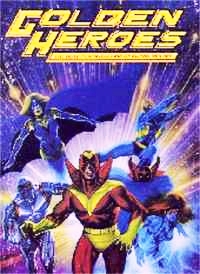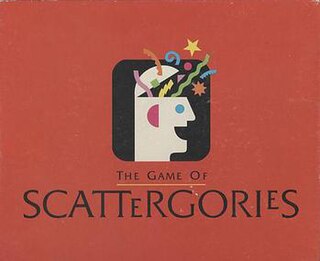
Golden Heroes is a British superhero role-playing game that was originally written and published on an amateur basis in 1981, and then republished in a more complete and professional form by Games Workshop in 1984.

Oh hell or contract whist is a trick-taking card game of British origin in which the object is to take exactly the number of tricks bid. It was first described by B. C. Westall around 1930 and originally called oh! well. It was said to have been introduced into America via the New York clubs in 1931. Phillips and Westall describe it as "one of the best round games".

Fictionary, also known as the Dictionary Game or simply Dictionary, is a word game in which players guess the definition of an obscure word. Each round consists of one player selecting and announcing a word from the dictionary, and other players composing a fake definition for it. The definitions, as well as the correct definition, are collected blindly by the selector and read aloud, and players vote on which definition they believe to be correct. Points are awarded for correct guesses, and for having a fake definition guessed by another player.

Balderdash is a board game variant of a classic parlour game known as Fictionary or the Dictionary Game. It was created by Laura Robinson and Paul Toyne of Toronto, Ontario, Canada. The game was first released in 1984 by the Canada Games Company. A US edition appeared that year from TSR, Inc., copyrighted to Gameworks Creations, Inc. and licensed from Canada Games. Subsequent editions have appeared from a variety of companies including The Games Gang, Hasbro and Mattel. The game has sold over 15 million copies worldwide to date. It is aimed at fans of word games, such as Scrabble.

Pig is a simple, collecting card game of early 20th century American origin suitable for three to thirteen players that is played with a 52-card French-suited pack. It has two very similar and well known variants – donkey and spoons. It is often classed as a children's game. It may be descended from an old game called vive l'amour.

Telephone, or Chinese whispers, is an internationally popular children's game in which messages are whispered from person to person and then the original and final messages are compared. This sequential modification of information is called transmission chaining in the context of cultural evolution research, and is primarily used to identify the type of information that is more easily passed on from one person to another.
Metafiction is a form of fiction that emphasizes its own narrative structure in a way that inherently reminds the audience that they are reading or viewing a fictional work. Metafiction is self-conscious about language, literary form, and story-telling, and works of metafiction directly or indirectly draw attention to their status as artifacts. Metafiction is frequently used as a form of parody or a tool to undermine literary conventions and explore the relationship between literature and reality, life and art.

Replay value is the potential of a video game or other media products for continued play value after its first completion. Factors that can influence perceived replay value include the game's extra characters, secrets and alternate endings. The replay value of a game may also be based entirely on the individual's tastes. A player might enjoy repeating a game because of the music, graphics, gameplay or because of product loyalty. Dynamic environments, challenging AI, a wide variety of ways to accomplish tasks, and a rich array of assets could result in a high replay value.

Academic Games is a competition in the U.S. in which players win by out-thinking each other in mathematics, language arts, and social studies. Formal tournaments are organized by local leagues, and on a national level by the Academic Games Leagues of America (AGLOA). Member leagues in eight states hold a national tournament every year, in which players in four divisions compete in eight different games covering math, English, and history. Some turn-based games require a kit consisting of a board and playing cubes, while other games have a central reader announcing questions or clues and each player answering individually.
InvisiClues were hint booklets sold by Infocom to help players solve puzzles in their interactive fiction computer games.
The Gelasian Decree is a Latin text traditionally thought to be a decretal of the prolific Pope Gelasius I (492-496). The work consists of five chapters: the second chapter of which is a list of books of Scripture defined as part of the biblical canon by a Council of Rome, traditionally dated to Pope Damasus I (366–383) and thus known as the Damasine List. The fifth chapter of the work includes a list of works not encouraged for church use.
A book report is an essay discussing the contents of a book, written as part of a class assignment issued to students in schools. There is a difference between a book report and a book review. A report includes a larger outline, and a review stays on the topic of the book. Teachers frequently give students a list of books from which they may choose one for the report, although sometimes students may select a work entirely of their own choosing. Teachers may set the list of books through such methods as including the works of one particular author, reading multiple works to students aloud and having each student select one of the books for the report, allow students to choose freely, or choose the books through a class selection process.

Scattergories is a creative-thinking category-based party game originally published by Milton Bradley in 1988. The objective of the 2-to-6-player game is to score points by uniquely naming objects, people, actions, and so forth within a set of categories, given an initial letter, within a time limit. The game is based on a traditional game called Categories.
Fiction writing is the composition of non-factual prose texts. Fictional writing often is produced as a story meant to entertain or convey an author's point of view. The result of this may be a short story, novel, novella, screenplay, or drama, which are all types of fictional writing styles. Different types of authors practice fictional writing, including novelists, playwrights, short story writers, radio dramatists and screenwriters.

Brain Age 2: More Training in Minutes a Day!, known as More Brain Training from Dr Kawashima: How Old Is Your Brain? in PAL regions, is an edutainment puzzle game and the sequel to Brain Age: Train Your Brain in Minutes a Day! (2005). It was developed and published by Nintendo for the Nintendo DS handheld game console. Before the game begins, the player must perform a Brain Age Check to determine their brain age, which ranges from 20 to 80, to determine approximately their brain's responsiveness. A brain age of 20, the lowest age that the player can achieve, indicates that the player's brain is as responsive as that of an average 20-year-old. After the player is told their initial brain age, they can complete a series of minigames to help improve their brain's responsiveness, after which they can run Brain Age Check again to determine their updated brain age.
Wise and Otherwise is a board game published by WiseandOtherwise.com Inc. The game includes a game board, six pawns, and a set of cards containing the beginnings and ends of obscure proverbs which are shown on opposite sides of the game cards.

Dixit, is a French board game created by Jean-Louis Roubira, illustrated by Marie Cardouat, and published by Libellud. Using a set of cards illustrated with dreamlike images, players select cards that match a title suggested by the designated storyteller player, and attempt to guess which card the storyteller selected. The game was introduced in 2008. Dixit won the 2010 Spiel des Jahres award.

The Jackbox Party Pack is a series of party video games developed by Jackbox Games for many different platforms on a near-annual release schedule since 2014. Each installment contains five games that are designed to be played in groups of varying sizes, including in conjunction with streaming services like Twitch which provide means for audiences to participate.

Writer Rabbit is a 1986 educational video game, part of the Reader Rabbit franchise. It was remade as Reader Rabbit 3 for MS-DOS compatible operating systems in 1993, then re-released for Microsoft Windows and Macintosh in 1994 under the title "Reader Rabbit 3 Deluxe!".

Where in the World is Carmen Sandiego? is a game within the Carmen Sandiego franchise made for the Prodigy Interactive online service, a "special edition" and Prodigy service adaptation of the 1985 Broderbund educational game of the same name.













